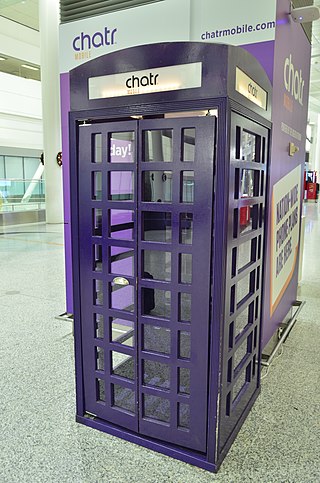
Telewest was a cable internet, broadband internet, telephone supplier and cable television provider in the United Kingdom. It was listed on the London Stock Exchange, and was also once a constituent of the FTSE 100 Index.

Bell Internet, originally and frequently still called Sympatico, is the residential Internet service provider (ISP) division of BCE Inc. As of May 3, 2012, Bell Internet had over 3 million subscribers in Ontario and Quebec, making it the largest ISP in Canada.
411 is a telephone number for local directory assistance in Canada and the United States. Until the early 1980s, 411 – and the related 113 number – were free to call in most jurisdictions.
Rogers Hi-Speed Internet is a broadband Internet service provider in Canada, owned by Rogers Communications. Rogers previously operated under the brand names Rogers@Home, Rogers Yahoo! Hi-Speed Internet, WAVE, and Road Runner in Newfoundland. It is currently the second largest Internet provider in Canada, after Bell Internet by customer count.
A toll-free telephone number or freephone number is a telephone number that is billed for all arriving calls. For the calling party, a call to a toll-free number from a landline is free of charge. A toll-free number is identified by a dialing prefix similar to an area code. The specific service access varies by country.

Bell Mobility Inc. is a Canadian wireless network operator and the division of Bell Canada which offers wireless services across Canada. It operates networks using LTE and HSPA+ on its mainstream networks. Bell Mobility is the third-largest wireless carrier in Canada, with 10.1 million subscribers as of Q3 2020.
Rogers Wireless Inc. is a Canadian mobile network operator headquartered in Toronto, providing service nationally throughout Canada. It is a wholly owned subsidiary of Rogers Communications. The company had revenues of just under $15.1 billion in 2018. Rogers Wireless is the largest wireless carrier in Canada, with 13.7 million subscribers as of Q2 2023.

Fido Solutions Inc. is a Canadian mobile network operator owned by Rogers Communications. Since its acquisition by Rogers in 2004, it has operated as a Mobile virtual network operator (MVNO) using the Rogers Wireless network.
In telecommunications, a long-distance call (U.S.) or trunk call is a telephone call made to a location outside a defined local calling area. Long-distance calls are typically charged a higher billing rate than local calls. The term is not necessarily synonymous with placing calls to another telephone area code.
GAIT is a wireless standard developed in 1999 that allows cross-operation of mobile telephone technologies. Phones compliant with the GAIT standard can operate on either contemporary GSM networks, or the legacy IS-136 TDMA and AMPS networks found extensively throughout North America.
Rogers Telecom Inc. is a subsidiary of Rogers Communications. It is a Canadian company based in Toronto that focuses on integrated communications as a provider of data, e-business and voice services to business and households. It used to be known as Sprint Canada Inc., pursuant to a 1993 branding agreement between parent Call-Net Enterprises Inc. with what is now Sprint Nextel Corporation.
Telus Mobility is a Canadian wireless network operator and a division of Telus Communications which sells wireless services in Canada on its network. It operates 5G+, 5G, LTE, HSPA+, and LPWA on its network. Telus Mobility is the second-largest wireless carrier in Canada, with 10.6 million subscribers as of Q3 2020.

Sprint Corporation was an American telecommunications company. Before being acquired by T-Mobile US on April 1, 2020, it was the fourth-largest mobile network operator in the United States, serving 54.3 million customers as of June 30, 2019. The company also offered wireless voice, messaging, and broadband services through its various subsidiaries under the Boost Mobile and Open Mobile brands and wholesale access to its wireless networks to mobile virtual network operators.

Virgin Plus is a Canadian provider of postpaid and prepaid wireless voice, text and data communications services throughout Canada. They also offer home Internet and TV services in select areas of Ontario and Quebec. Launched as Virgin Mobile Canada on March 1, 2005, as a joint venture between Virgin Group and BCE Inc., BCE took sole ownership on July 1, 2009, when it closed a deal to purchase the stake it did not already own. Virgin Plus calls its customers 'Members' and offers a Member Benefits program, which provides its customers with special offers, discounts, and VIP experiences.

Embarq Corporation was the largest independent local exchange carrier in the United States, serving customers in 18 states and providing local, long-distance, high-speed data and wireless services to residential and business customers. It had been formerly the local telephone division (LTD) of Sprint Nextel until 2006, when it was spun off as an independent company. Embarq produced more than $6 billion in revenues annually, and had approximately 18,000 employees. It was based in Overland Park, Kansas.

Solo Mobile is a discontinued mobile virtual network operator in Canada started by Bell Mobility in 2000. Historically, Solo was considered a discount wireless brand, offering low price monthly plans with some unlimited options in certain cities. Its products and services were only sold in British Columbia, Alberta, Ontario and Quebec. The brand ceased advertising towards new customers since November 2011, and new activations were officially discontinued on May 17, 2012.

Koodo Mobile is a Canadian mobile flanker brand started by Telus in 2008 and mostly oriented toward younger customers. Koodo differs from its parent Telus by not requiring a fixed term contract. Koodo currently provides postpaid, prepaid, and wireless home phone services. Being a subsidiary of Telus, Koodo has been able to offer extensive coverage and a strong presence in mobile retailers. This allowed Koodo to gain a presence nationwide.
The system access fee is a non-governmental surcharge imposed by most Canadian telephone companies on their customers' monthly bills. Although it is normally charged for wireless services, Rogers Communications and the now-defunct Sprint Canada also charged its home phone customers a system access fee.

Data and Audio-Visual Enterprises Wireless, d/b/a Mobilicity, was a Canadian mobile virtual network operator (MVNO) owned by Rogers Communications. Its name was a portmanteau of the words "mobility" and "simplicity". Mobilicity was one of several new mobile network operators, along with Public Mobile and Wind Mobile, which launched in Canada after a government initiative to encourage competition in the wireless sector. The carrier had over 250,000 Mobilicity subscriptions on May 16, 2013, the day in which Telus announced its failed attempt to acquire Mobilicity. The subscription count decreased to 157,000 by April 2015 according to court documents filed by Mobilicity's Chief Restructuring Officer in that month.

Chatr Mobile is a Canadian mobile virtual network operator owned by Rogers Communications Canada targeting entry-level customers. It is one of three wireless brands owned by Rogers Communications, including Rogers Wireless, and Fido Solutions. The provider launched its service in Toronto, Ottawa, Calgary, Edmonton, Vancouver, Quebec City, and Montreal under the name Chatr Wireless on July 28, 2010. The company re-branded to its current name in 2015.











